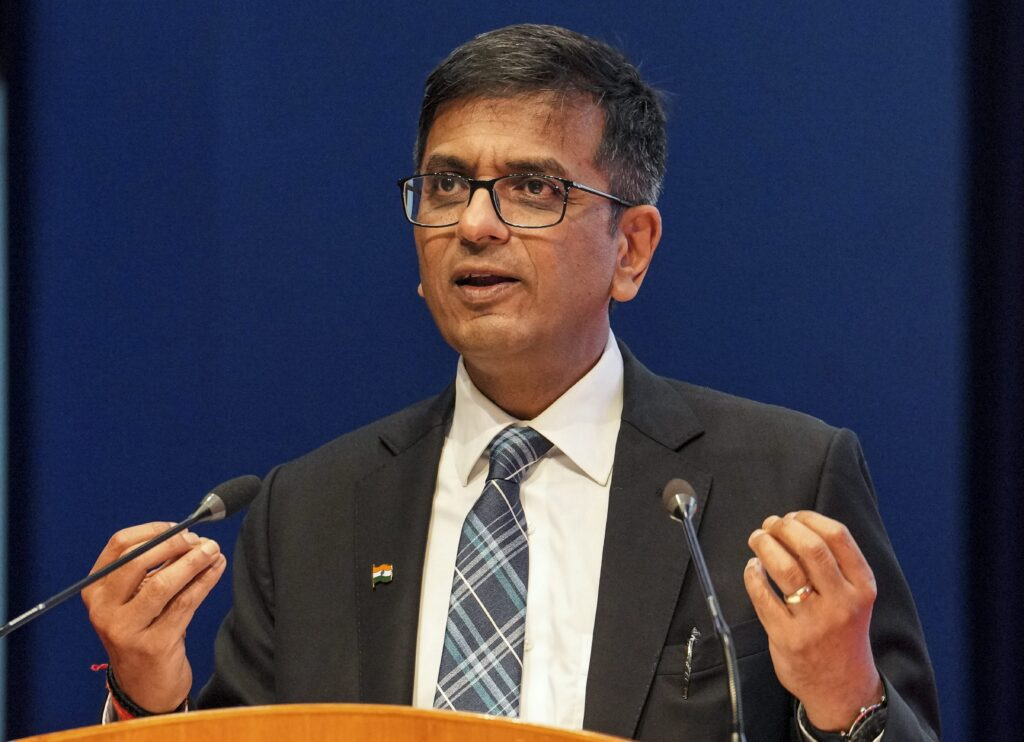NEW DELHI, Jan 6: The Lokpal, India’s anti-corruption ombudsman, has dismissed a complaint accusing former Chief Justice of India DY Chandrachud of corruption, citing “lack of jurisdiction” in an official order.
The complaint, submitted on October 18, 2024, alleged misconduct by the then-sitting CJI for purportedly abusing his position to benefit a particular politician and political party.
CJI Chandrachud stepped down on November 10.
In its order, the Lokpal thoroughly reviewed whether a sitting CJI or Supreme Court judge fell under its jurisdiction as outlined in Section 14 of the Lokpal and Lokayuktas Act, ultimately choosing not to address the extensive allegations detailed in the 382-page complaint.
“We say no more,” stated the order dated January 3.
“Given the circumstances, we dismiss this complaint for being outside our jurisdiction,” the decision from Lokpal Chairperson Justice AM Khanwilkar and five other members indicated.
The Lokpal advised the complainant to seek alternative legal remedies available under the law.
“We do not wish to indicate any stance on the validity of the allegations, nor the feasibility of any legal recourse the complainant might pursue,” it added.
The Lokpal evaluated various provisions under Section 14, which stipulates the jurisdiction of the Lokpal includes the Prime Minister, ministers, members of Parliament, and central government officials across various grades.
“The interpretation of this section leads us to conclude that only the designated individuals mentioned therein are subject to the Lokpal’s jurisdiction as public servants for whom the Lokpal is required to investigate allegations of corruption as defined by the Prevention of Corruption Act, 1988,” the order explained.
Clearly, a sitting judge or CJI is not encompassed within the specified categories of clauses (a) to (e), (g), and (h), according to the order.
“The only potentially applicable clause would be Clause (f), which, however, stipulates that it pertains to individuals involved with a ‘body’ or organization created by an Act of Parliament or funded by the central government,” it noted.
At first glance, it is evident that the Supreme Court is a collective of judges organized for a shared objective or purpose, the order pointed out.
“Judges, including those on the Supreme Court, qualify as public servants under the definition provided in Section 2(c) of the PC Act,” it asserted.
A court judge does not fall within the exempt category of public servants over whom jurisdiction may be exercised by any court or relevant authority under the specified acts, as outlined in the order.
“In this context, judges are public servants and may face proceedings for acts of corruption, including under the PC Act, as clarified by the Constitution Bench of the Supreme Court in the case of K Veeraswami vs Union of India and Ors…,” it elaborated.
The key inquiry is “whether the Supreme Court of India is a body created by an ‘Act of Parliament’”, the order stated, adding that the terminology in Section 14 of the Act is unambiguous and leaves little room for interpretation.
“We must remember the fundamental principle of statutory interpretation which favors strict interpretation of penal statutes,” it remarked.
“Thus, it must first be established if it is conceivable that the Supreme Court of India was formed by an ‘Act of Parliament’. The answer is a definitive ‘NO’. The Supreme Court derives its authority from Article 124 of the Constitution of India,” it continued.
In short, the Supreme Court, despite being comprised of judges, does not qualify as a “body” under Section 14(1)(f) of the Act, since it is not constituted by an “Act of Parliament” as defined, the order concluded.
Moreover, the Supreme Court is neither entirely nor partially funded by or controlled by the central government, it specified.
This reasoning similarly applies to the justices of the Supreme Court and the CJI, indicating they are not financed or governed by the central government, according to the Lokpal.
“Consequently, it follows that a sitting judge of the Supreme Court or the Chief Justice of the Supreme Court is not subject to the limited jurisdiction of the Lokpal of India under Section 14 of the Act of 2013,” the order stated.
However, the Lokpal clarified that this interpretation applies solely to the status of the Supreme Court judges and the CJI, established under Article 124 of the Constitution.
“This perspective may not extend to judges from other courts, such as high courts…,” it added in its ruling. (PTI)


Leave a Reply